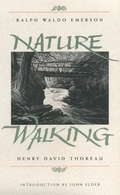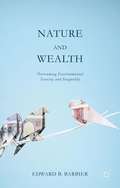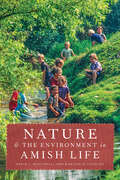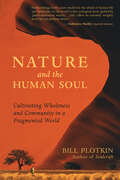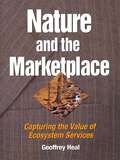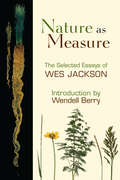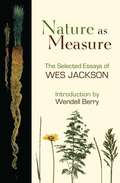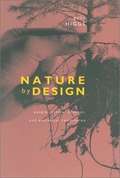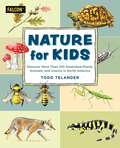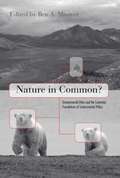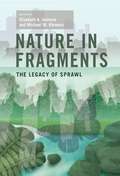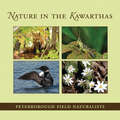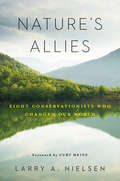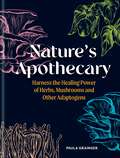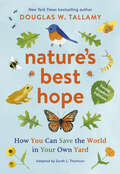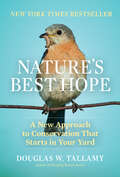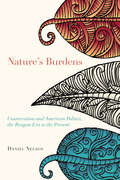- Table View
- List View
Nature and Walking
by Ralph Waldo Emerson Henry David ThoreauTogether in one volume, Emerson's Nature and Thoreau's Walking, is writing that defines our distinctly American relationship to nature.
Nature and Wealth: Overcoming Environmental Scarcity and Inequality
by Edward B. BarbierNature and Wealth.
Nature and the Environment in Amish Life (Young Center Books in Anabaptist and Pietist Studies)
by David L. McConnell Marilyn D. LovelessThe Amish relationship to the environment is much more complicated than you might think.The pastoral image of Amish communities living simply and in touch with the land strikes a deep chord with many Americans. Environmentalists have lauded the Amish as iconic models for a way of life that is local, self-sufficient, and in harmony with nature. But the Amish themselves do not always embrace their ecological reputation, and critics have long questioned the portrayal of the Amish as models of environmental stewardship.In Nature and the Environment in Amish Life, David L. McConnell and Marilyn D. Loveless examine how this prevailing notion of the environmentally conscious Amish fits with the changing realities of their lives. Drawing on 150 interviews conducted over the course of 7 years, as well as a survey of household resource use among Amish and non-Amish people, they explore how the Amish understand nature in their daily lives and how their actions impact the natural world. Arguing that there is considerable diversity in Amish engagements with nature at home, at school, at work, and outdoors, McConnell and Loveless show how the Amish response to regional and global environmental issues, such as watershed pollution and climate change, reveals their deep skepticism of environmentalists. They also demonstrate that Amish households are not uniformly lower in resource use compared to their rural, non-Amish neighbors, though aspects of their home economy are relatively self-sufficient.The first comprehensive study of Amish understandings of the natural world, this compelling book complicates the image of the Amish and provides a more realistic understanding of the Amish relationship with the environment.
Nature and the Human Soul: Cultivating Wholeness and Community in a Fragmented World
by Bill PlotkinAddressing the pervasive longing for meaning and fulfillment in this time of crisis, Nature and the Human Soul introduces a visionary ecopsychology of human development that reveals how fully and creatively we can mature when soul and wild nature guide us. Depth psychologist and wilderness guide Bill Plotkin presents a model for a human life span rooted in the cycles and qualities of the natural world, a blueprint for individual development that ultimately yields a strategy for cultural transformation. If it is true, as Plotkin and others observe, that we live in a culture dominated by adolescent habits and desires, then the enduring societal changes we so desperately need won’t happen until we individually and collectively evolve into an engaged, authentic adulthood. With evocative language and personal stories, including those of elders Thomas Berry and Joanna Macy, this book defines eight stages of human life — Innocent, Explorer, Thespian, Wanderer, Soul Apprentice, Artisan, Master, and Sage — and describes the challenges and benefits of each. Plotkin offers a way of progressing from our current egocentric, aggressively competitive, consumer society to an ecocentric, soul-based one that is sustainable, cooperative, and compassionate. At once a primer on human development and a manifesto for change, Nature and the Human Soul fashions a template for a more mature, fulfilling, and purposeful life — and a better world.
Nature and the Marketplace: Capturing The Value Of Ecosystem Services
by Geoffrey HealIn recent years, scientists have begun to focus on the idea that healthy, functioning ecosystems provide essential services to human populations, ranging from water purification to food and medicine to climate regulation. Lacking a healthy environment, these services would have to be provided through mechanical means, at a tremendous economic and social cost.Nature and the Marketplace examines the controversial proposition that markets should be designed to capture the value of those services. Written by an economist with a background in business, it evaluates the real prospects for various of nature's marketable services to "turn profits" at levels that exceed the profits expected from alternative, ecologically destructive, business activities. The author: describes the infrastructure that natural systems provide, how we depend on it, and how we are affecting it explains the market mechanism and how it can lead to more efficient resource use looks at key economic activities -- such as ecotourism, bioprospecting, and carbon sequestration -- where market forces can provide incentives for conservation examines policy options other than the market, such as pollution credits and mitigation banking considers the issue of sustainability and equity between generations .Nature and the Marketplace presents an accessible introduction to the concept of ecosystem services and the economics of the environment. It offers a clear assessment of how market approaches can be used to protect the environment, and illustrates that with a number of cases in which the value of ecosystems has actually been captured by markets.The book offers a straightforward business economic analysis of conservation issues, eschewing romantic notions about ecosystem preservation in favor of real-world economic solutions. It will be an eye-opening work for professionals, students, and scholars in conservation biology, ecology, environmental economics, environmental policy, and related fields.
Nature as Measure: The Selected Essays of Wes Jackson
by Wendell Berry Wes JacksonWes Jackson can teach us many things about the land, soil, and conservation, but what most resonates is this: The ecosphere is self-regulating, and as often as we attempt to understand it, we are not its builders, and our manuals will often be faulty. The only responsible way to learn the nuances of the land is to study the soil and vegetation in their natural state and pass this knowledge on to future generations.In Nature as Measure, a collection of Jackson's essays from Altars of Unhewn Stone and Becoming Native to This Place, these ideas of land conservation and education are written from the point of view of a man who has practiced what he's preached and proven that it is possible to partially restore much of the land that we've ravaged. Wes Jackson lays the foundation for a new farming economy, grounded in nature's principles and located in dying small towns and rural communities. Exploding the tenets of industrial agriculture, Jackson seeks to integrate food production with nature in a way that sustains both.
Nature as Measure: The Selected Essays of Wes Jackson
by Wes JacksonIn 'Nature as Measure', a collection of Jackson's essays, the ideas of land conservation and education are written from the point of view of a man who has practiced what he's preached and proven that it is possible to partially restore much of the land that we've ravaged.
Nature at Night: Discover the Hidden World That Comes Alive after Dark
by Charles HoodA new world awakens in the dark, filled with spectacular bioluminescence, moon-kissed flora, and diverse wildlife—all captured in this spectacular photography book. While old tales warn us that danger lies waiting in the dark, there is actually an abundance of thriving, colorful life. Solar winds brighten the sky with Northern and Southern Lights. In the desert, elegant datura blooms at night, enticing moths to help with pollination, while in the Rockies grizzly bears make a meal of the insects to sustain them during hibernation. In the ocean, night-feeding dolphins chase nocturnal squid which have made a vertical migration to the surface. In the jungles, jaguars hunt by moonlight while night monkeys swing safely through the trees. Experienced naturalist and photographer Charles Hood captures it all, sharing his nocturnal adventures all over the world, with insight, wit, and over 240 stunning photographs. Open your senses to this darkened world, which is strange yet familiar—and more beautiful than you ever imagined.
Nature at Your Door: Connecting with the Wild and Green in the Urban and Suburban Landscape
by Sara A. GagnéWe are an integral part of the ecosystem where we live. In this book we learn that what we do in our yards matters just as much as the way our local parks and nature preserves are managed. Author and professor of landscape ecology Sara Gagné focuses on the ecological importance of our day-to-day activities and spaces we are most familiar with and can most influence. With cutting-edge science, anecdotal experiences, and practical recommendations, Sara brings the message of how people and nature are vitally connected in the urban and suburban landscape.Each chapter is dedicated to a particular space—beginning with the yard, moving onto the street, the park, the greenway, the neighborhood, and the town/city. She tells stories of the latest ecological research, interwoven with her own experiences studying animals, to show readers how they affect nature and how nature in wilder, greener spaces affect us in both positive and negative ways. Sidebars feature practical steps readers can take to deepen their connections with nature. Based on the author&’s fifteen years of research and teaching in urban ecology, the wide variety of places and topics covered in this book adds a fresh perspective to urban nature writing and appeals to those who want to take action to make the places they live greener, healthier, and more biodiverse for themselves, the wildlife, and the earth.
Nature beyond Solitude: Notes from the Field
by John Seibert FarnsworthJohn Seibert Farnsworth's delightful field notes are not only about nature, but from nature as well. In Nature Beyond Solitude, he lets us peer over his shoulder as he takes his notes. We follow him to a series of field stations where he teams up with scientists, citizen scientists, rangers, stewards, and grad students engaged in long-term ecological study, all the while scribbling down what he sees, hears, and feels in the moment. With humor and insight, Farnsworth explores how communal experiences of nature might ultimately provide greater depths of appreciation for the natural world.In the course of his travels, Farnsworth visits the Hastings Natural History Reservation, the Santa Cruz Island Reserve, the Golden Gate Raptor Observatory, the H.J. Andrews Experimental Forest, the North Cascades Institute's Environmental Learning Center, and more.
Nature by Design: People, Natural Process, and Ecological Restoration
by Eric S. HiggsEcological restoration is the process of repairing human damage to ecosystems. It involves reintroducing missing plants and animals, eliminating hazardous substances, and returning natural processes to places that thrive on their regular occurrence.
Nature for Kids: Discovering More Than 100 Illustrated Plants, Animals, and Insects in North America (For Kids)
by Todd TelanderAn illustrated, kid-friendly guide to the magic of natureEmbark on an unforgettable journey with Nature for Kids as celebrated outdoor illustrator and author Todd Telander unveils a curated collection of 101 captivating plants, animals, and insects found across North America. This expertly crafted guide is tailor-made for kids, brimming with vibrant illustrations, engaging activities, and fascinating anecdotes that will ignite a sense of wonder and deepen their understanding of the natural world.With each turn of the page, the captivating illustrations will transport children into the heart of the wilderness, while the interactive activities will spark their curiosity and foster a love for nature. From towering trees to elusive wildlife and delicate winged creatures, this immersive book is the perfect companion for young adventurers seeking to unravel the secrets of the wild.Nature for Kids is more than just a book; it's an invitation to unlock the wonders of our natural heritage. Join the expedition, ignite a lifelong passion for the environment, and empower children with the knowledge to identify and appreciate the incredible biodiversity that surrounds us. Get ready for an awe-inspiring journey that will forever transform the way children see and connect with the world around them.
Nature in Common?: Environmental Ethics and the Contested Foundations of Environmental Policy
by Ben A. MinteerThis important book brings together leading environmental thinkers to debate a central conflict within environmental philosophy: should we appreciate nature mainly for its ability to advance our interests or should we respect it as having a good of its own, apart from any contribution to human well-being? Specifically, the fourteen essays collected here discuss the "convergence hypothesis" put forth by Bryan Norton--a controversial thesis in environmental ethics about the policy implications of moral arguments for environmental protection. Historically influential essays are joined with newly-commissioned essays to provide the first sustained attempt to reconcile two long-opposed positions. Bryan Norton himself offers the book's closing essay. This seminal volume contains contributions from some of the most respected scholars in the field, including Donald Brown, J. Baird Callicott, Andrew Light, Holmes Rolston III, Laura Westra, and many others. Although Nature in Common? will be especially useful for students and professionals studying environmental ethics and philosophy, it will engage any reader who is concerned about the philosophies underlying contemporary environmental policies.
Nature in Fragments: The Legacy of Sprawl (American Museum of Natural History, Center for Biodiversity Conservation, Series on Biodiversity)
by Elizabeth Johnson Michael KlemensThis new collection focuses on the impact of sprawl on biodiversity and the measures that can be taken to alleviate it. Leading biological and social scientists, conservationists, and land-use professionals examine how sprawl affects species and alters natural communities, ecosystems, and natural processes. The contributors integrate biodiversity issues, concerns, and needs into the growing number of anti-sprawl initiatives, including the "smart growth" and "new urbanist" movements.
Nature in Translation: Japanese Tourism Encounters the Canadian Rockies
by Shiho SatsukaNature in Translation is an ethnographic exploration in the cultural politics of the translation of knowledge about nature. Shiho Satsuka follows the Japanese tour guides who lead hikes, nature walks, and sightseeing bus tours for Japanese tourists in Canada's Banff National Park and illustrates how they aspired to become local "nature interpreters" by learning the ecological knowledge authorized by the National Park. The guides assumed the universal appeal of Canada's magnificent nature, but their struggle in translating nature reveals that our understanding of nature--including scientific knowledge--is always shaped by the specific socio-cultural concerns of the particular historical context. These include the changing meanings of work in a neoliberal economy, as well as culturally-specific dreams of finding freedom and self-actualization in Canada's vast nature. Drawing on nearly two years of fieldwork in Banff and a decade of conversations with the guides, Satsuka argues that knowing nature is an unending process of cultural translation, full of tensions, contradictions, and frictions. Ultimately, the translation of nature concerns what counts as human, what kind of society is envisioned, and who is included and excluded in the society as a legitimate subject.
Nature in the Kawarthas
by Peterborough Field NaturalistsHere you will find a wealth of information on the fauna, flora, and natural wonders of the Kawarthas. The Kawarthas sit astride the Canadian Shield and fertile lands to the south. This is cottage country a place where people are closer to nature and where children and adults remark on the sightings of animals, birds, and butterflies from windows and lakeside chairs and ask questions about what they see. This book is a valuable asset and will answer many of these questions. It offers an alternative to a shelf of field guides and deals with what can be expected in a relatively small but uniquely rich environment close to home. Nature in the Kawarthas presents a wealth of information about the birds, mammals, insects, flowers, reptiles, and amphibians that inhabit this special area. It discusses rare habitats and the behaviours of animals ranging from frogs to birds of prey. A Places to Go section recommends the best areas to visit to explore the natural wonders of this amazing region and its treasure of wild biodiversity. It is a true layman’s guide to nature in the Kawarthas.The Peterborough Field Naturalists (PFN) is a registered charity and active club in Peterborough, Ontario, that dates back to 1940. The authors include knowledgeable naturalists, teachers, and university and ministry professionals in a wide variety of wildlife fields. Their goal is to know, appreciate, and conserve nature in all its forms.
Nature into Art: The Gardens of Wave Hill
by Thomas Christopher“Like Wave Hill itself, these pages make an indelible impression—wildly intimate, possibility-laden, provocative—leaving me wide awake and hungry for a visit.” —Margaret Roach, author of A Way to Garden Wave Hill, a world-renowned public garden in the Bronx, boasts a classic horticultural craftsmanship unrivaled among other public gardens in the United States. But it also embraces a design spirit that is daring and innovative. Every year brings changes to Wave Hill: new combinations of colors, textures, and forms, along with creative themes and constant experimentation. Nature into Art brings this splendid, sensory experience home by honoring the unsurpassed beauty of Wave Hill. It explores the different areas of the garden—the flower garden, the shade border, the wild garden, the conservatory, and more—and gives gardeners helpful information on the plants, techniques, and design choices that define this iconic space. Filled with stunning, ethereal photography by Ngoc Minh Ngo, Nature into Art will enchant and inspire you to practice the Wave Hill way of gardening.
Nature of the Place: On the Flora and Fauna of the Adirondacks
by Edward KanzeA love letter to the Adirondacks, revealing the hidden wonders and interconnected lives of its wildlife by one of the region&’s most prolific and prominent residents.The Nature of the Place is storied Adirondack nature writer Edward Kanze&’s invitation to slow down, smell the roses, and get to know fellow creatures with more longstanding claims to this landscape than we have. Theirs is the real internet, a web of life that weaves together an almost infinite number of threads into a fabric that&’s a wonder to behold and something close to a miracle in a largely hostile universe.In these dazzling pages, readers meet the big charismatic animals of the Adirondacks, the black bear and the moose. We encounter little creatures, too, all of which lead fascinating lives while nearly unseen: tiny fish that live in exquisite mountain streams; the infuriating and almost invisible biting insects called no-see-ums; centipedes; millipedes; and earthworms. Discover an orchid that pays a steep price for its rough treatment of bumblebees; plants so desperate for nitrogen they&’ve taken to catching animals and eating them; poison-ivy and the reasons why we might want to exchange our dislike of it for love; and a common wildflower that goes through serial sex changes. Loons, owls, falcons, eagles, and songbirds pour out effusions of apparent ecstasy here, along with much about bobcats, foxes, snowshoe hares, beavers, and flying squirrels. Snakes, frogs, salamanders, and big predatory fish make appearances also, as well as fungi that produce light in the dark, and bacteria that manipulate the atmosphere to their own advantage, even causing rain and snow to fall.The Nature of the Place is Kanze&’s love letter to his home, the Adirondacks. Gathering materials from his decades-long column at the Adirondack Explorer and elsewhere, extensively revised and rewritten for this book, Kanze&’s singular meditations on the flora and fauna of his home resonate far beyond his own beautiful, beloved, biologically vibrant neck of the woods.
Nature on the Doorstep: A Year of Letters
by Angela E. DouglasNature on the Doorstep reveals the simple pleasures of paying attention to the natural world in one's own backyard over the course of a year. In weekly letters, Angela Douglas shares the joys and curiosities of a decidedly ordinary patch of green in upstate New York cultivated through the art of "strategic neglect"—sometimes taking a hand to manage wildlife, more often letting nature go its own way. From the first flowers of spring to cardinals singing in the winter, Douglas shows us the magic of welcoming unexpected plant and animal life into one's backyard. A paean to the richness we find when we stop to look and let be, Nature on the Doorstep celebrates the role humble backyards play both in conservation efforts and in an expanded appreciation of the living world.
Nature's Allies: Eight Conservationists Who Changed Our World
by Larry NielsenIt's easy to feel powerless in the face of big environmental challenges—but we need inspiration more than ever. With political leaders who deny climate change, species that are fighting for their very survival, and the planet's last places of wilderness growing smaller and smaller, what can a single person do? InNature's Allies, Larry Nielsen uses the stories of conservation pioneers to show that through passion and perseverance, we can each be a positive force for change.In eight engaging and diverse biographies—John Muir, Ding Darling,Aldo Leopold, Rachel Carson, Chico Mendes,Billy Frank Jr., Wangari Maathai, and Gro Harlem Brundtland—we meet individuals who have little in common except that they all made a lasting mark on our world. Some famous and some little known to readers, they spoke out to protect wilderness, wildlife, fisheries, rainforests, and wetlands. They fought for social justice and exposed polluting practices. They marched, wrote books, testified before Congress, performed acts of civil disobedience, and, in one case, were martyred for their defense of nature.Nature's Alliespays tribute to them all as it rallies a new generation of conservationists to follow in their footsteps.These vivid biographies are essential reading for anyone who wants to fight for the environment against today's political opposition. Nature's Allies will inspire students, conservationists, and nature lovers to speak up for nature and show the power of one person to make a difference.
Nature's Apothecary: Harness the healing power of herbs, mushrooms and other adaptogens
by Paula GraingerDiscover the restorative power of adaptogensIn Nature's Apothecary, Medical Herbalist Paula Grainger provides the solution for stress, anxiety and exhaustion by introducing us to a group of healing herbal ingredients known as adaptogens - plants with health-giving properties.Adaptogens have been scientifically proven to lower levels of the stress hormone cortisol and prevent adrenal imbalances that can lead to fatigue and burnout. In this illustrated guidebook you will delve into the history and science of these miraculous plants and learn how to maximize wellness using the most easy-to-source adaptogens, incorporating them into your life via delicious smoothies, energy bites and desserts, invigorating teas, tonics and lattes and wonderful beauty elixirs.Covering all the common adaptogens such as Ashwagandha, Maca, Korean ginseng, Turmeric, Liquorice, Rosemary and Rhodiola, this updated edition also contains brand-new recipes and information about the benefits of popular fungal adaptogens including Reishi, Lion's Mane, Cordyceps, Shiitake and Oyster mushrooms.
Nature's Apothecary: Harness the healing power of herbs, mushrooms and other adaptogens
by Paula GraingerDiscover the restorative power of adaptogensIn Nature's Apothecary, Medical Herbalist Paula Grainger provides the solution for stress, anxiety and exhaustion by introducing us to a group of healing herbal ingredients known as adaptogens - plants with health-giving properties.Adaptogens have been scientifically proven to lower levels of the stress hormone cortisol and prevent adrenal imbalances that can lead to fatigue and burnout. In this illustrated guidebook you will delve into the history and science of these miraculous plants and learn how to maximize wellness using the most easy-to-source adaptogens, incorporating them into your life via delicious smoothies, energy bites and desserts, invigorating teas, tonics and lattes and wonderful beauty elixirs.Covering all the common adaptogens such as Ashwagandha, Maca, Korean ginseng, Turmeric, Liquorice, Rosemary and Rhodiola, this updated edition also contains brand-new recipes and information about the benefits of popular fungal adaptogens including Reishi, Lion's Mane, Cordyceps, Shiitake and Oyster mushrooms.
Nature's Best Hope (Young Readers' Edition): How You Can Save the World in Your Own Yard
by Douglas W. TallamyThis middle grade edition of the groundbreaking bestseller by Doug Tallamy will inspire kids to use their backyard to help save the planet. Douglas W. Tallamy awakened thousands of readers to an urgent situation: wildlife populations are in decline because the native plants they depend on are fast disappearing. His solution? Plant more natives. In this middle grade adaptation of the New York Times bestseller Nature's Best Hope, Tallamy outlines his vision for a grassroots approach to conservation that everyone can participate in regardless of age. In Nature's Best Hope (Young Readers' Edition), Tallamy empowers kids to use their own yards to help combat the negative effects of climate change. He does so by breaking down complex concepts into simple terms and real-world examples that kids can easily grasp. Black and white photographs help further clarify concepts. In addition to sharing the science, Tallamy encourages kids to take direct action. Some of these ideas include planting an oak tree (one of the most important tree species) at home. If that&’s too large of a task, he suggests they can plant asters—a beautiful flower whose pollen bees use to feed their young. By helping the next generation see that they have power and agency over our collective future, this empowering book will drive home the positive point that kids are truly nature&’s best hope.
Nature's Best Hope: A New Approach to Conservation that Starts in Your Yard
by Douglas W. Tallamy&“Tallamy lays out all you need to know to participate in one of the great conservation projects of our time. Read it and get started!&” —Elizabeth Kolbert, Pulitzer Prize-winning author of The Sixth Extinction Douglas W. Tallamy&’s first book, Bringing Nature Home, awakened thousands of readers to an urgent situation: wildlife populations are in decline because the native plants they depend on are fast disappearing. His solution? Plant more natives. In this new book, Tallamy takes the next step and outlines his vision for a grassroots approach to conservation. Nature&’s Best Hope shows how homeowners everywhere can turn their yards into conservation corridors that provide wildlife habitats. Because this approach relies on the initiatives of private individuals, it is immune from the whims of government policy. Even more important, it&’s practical, effective, and easy—you will walk away with specific suggestions you can incorporate into your own yard. If you&’re concerned about doing something good for the environment, Nature&’s Best Hope is the blueprint you need. By acting now, you can help preserve our precious wildlife—and the planet—for future generations.
Nature's Burdens: Conservation and American Politics, The Reagan Era to the Present
by Daniel NelsonNature’s Burdens is a political and intellectual history of American natural resource conservation from the 1980s into the twenty-first century—a period of intense political turmoil, shifting priorities among federal policymakers, and changing ideas about the goals of conservation. Telling a story of persistent activism, conflict, and frustration but also of striking achievement, it is an account of how new ideas and policies regarding human relationships to plants, animals, and their surroundings have become vital features of modern environmentalism. In the 1960s and 1970s, Congress embraced the largely dormant movement to preserve distinctive landscapes and the growing demand for outdoor recreation, establishing an unprecedented number of parks, monuments, and recreation areas. The election of Ronald Reagan and a shift to a Republican-controlled Senate brought this activity to an abrupt halt and introduced a period of intense partisanship and legislative gridlock that extends to the present. In this political climate, three developments largely defined the role of conservation in contemporary society: environmental organizations have struggled to defend the legal status quo, private land conservation has become increasingly important, and the emergence of potent scientific voices has promoted the protection of animals and plants and injected a new sense of urgency into the larger cause. These developments mark this period as a distinctive and important chapter in the history of American conservation. Scrupulously researched, scientifically and politically well informed, concise, and accessibly written, Nature’s Burdens is the most comprehensive examination of recent efforts to protect and enhance the natural world. It will be of interest to environmental historians, environmental activists, and any general reader interested in conservation.
